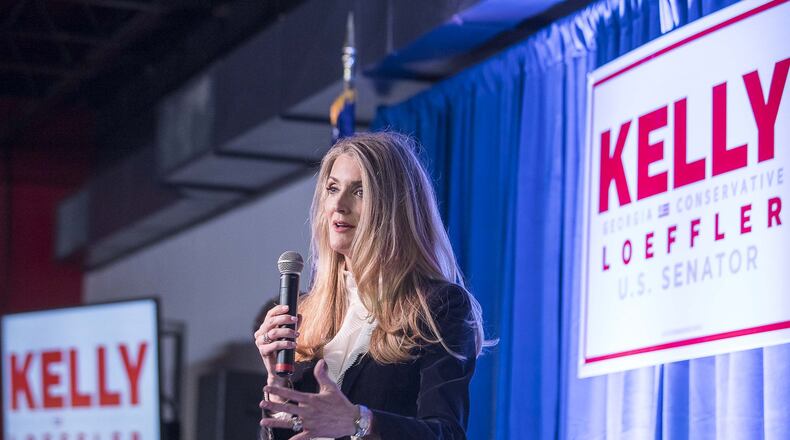U.S. Sen. Kelly Loeffler will submit documents next week that for the first time publicly outline the business interests, investments and income that make up her fortune.
These financial disclosures are due on or about Tuesday — barring any further extensions — and will likely confirm that Loeffler is by far the wealthiest member of Congress. They are also likely to contribute to a fresh round of scrutiny of the senator’s wealth and debate about whether her investments create potential conflicts of interest.
Because members of Congress are only required to report assets and liabilities within ranges, this document won't give a definite answer about Loeffler's net worth. But it will shed light on whether that number is close to $500 million, which is most commonly reported, or has reached $800 million, as one recent article circulated by Loeffler's team says.
Loeffler’s office did not respond to questions about how she is preparing for next week’s deadline other than to say her disclosures will be filed at the appropriate time.
Separately, Loeffler is also expected to file a report that indicates she has followed through on a promise to sell off stocks in individual companies owned by the senator or her husband, Jeff Sprecher. The couple announced earlier this month that they would put their wealth in exchange-traded funds instead, an attempt to pivot away from the controversy caused by stock sales and purchases on their behalf during the coronavirus pandemic.
The Campaign Legal Center, a nonpartisan government watchdog group, recently produced a study of trading by members of Congress during the outbreak. Loeffler was among 12 senators who made a total of 227 transactions worth as much as $98.3 million. Georgia’s other U.S. senator, David Purdue, was also among this group.
On the House side, there were 1,358 sales and purchases by 37 members that were worth up to $60.5 million. None of the U.S. House members from Georgia reported any activity during the months of February and March.
In its report, the Campaign Legal Center said the volume of trading and the reality that lawmakers were selling and purchasing shares in companies directly affected by the pandemic has diminished public trust.
“Even if officials rely on financial advisers to make trading decisions on their behalf, the perception of conflicts of interests remains because the public does not know the back and forth behind those communications,” the report said.
Both Loeffler and Perdue have denied wrongdoing and said their transactions are handled by financial advisers who have control of their portfolios. The Campaign Legal Center applauded Loeffler’s decision to no longer invest in individual companies’ stocks.
“That’s the way to do it; that is the way to remove conflict,” said Kedric Payne, the organization’s general counsel.
Watchdog groups and Loeffler’s opponents — both Republicans and Democrats — are awaiting her financial disclosure, which is likely to result in several pages of listings of her various business and investment interests. The document will provide a snapshot of her financial holdings from about the time of her swearing-in, and it may not reflect recent changes in her investment portfolio.
The Center for Responsive Politics combs through financial disclosures each year to provide an overview of each member of Congress' personal wealth. That information, which includes an estimated net worth based on the ranges listed on the disclosures, is published on the website OpenSecrets.org.
“Our goal is to actually make this transparent,” said Alex Baumgart, a researcher for the organization. “So we’re putting in the work to collect these reports, digitize these reports and share them publicly.”
Most U.S. senators submit financial disclosures as candidates for office, but Loeffler was appointed, not elected. After she was sworn into office Jan. 6, she faced a 30-day deadline to submit the document but asked for and was granted a 90-day extension.
She also will be required to file annual financial disclosures as long as she remains in office, which is the same for every member of Congress. Usually that document is due in May, but members were given an extension to August because of logistical issues caused by the pandemic.
About the Author
Keep Reading
The Latest
Featured





